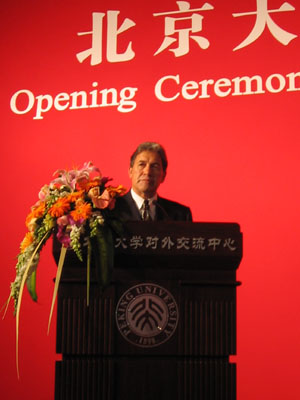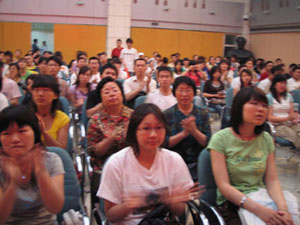The Great Firewall decided to temporarily block blogspot, and my personal site last week. The usual random pattern, I thought - but a few days later, today, it's the anniversary that dare not speak its name (rhymes with Loon North). Ah. Still, today when you Google 'Tiananmen' from Beijing, you get a page of Wikipedia and BBC listings describing the incident (links blocked though), and if you image-google, you get columns of Tanks, Tank Man, and a pile of dead people.
This has been done before on this very site, but what better day to have another go at it. When you use Chinese google, and misstype ‘六死事件’ it handily asks in Chinese, 'do you mean the June 4th incident?' The first-page results are mostly Chinese news reports relating to how the 'incident' has affected foreign relations, and even one on the previously proscribed commemoration of Hu Yaobang's birthday, whose death marked the beginning of the demonstrations. When you image-Google 'June 4th incident' you get one relevant picture on the page - a demonstration scene; when you image-Google 'Tiananmen incident' (and remember, Googling 'Tiananmen' in China is like Googling 'Aotea Square' in New Zealand', so getting that comical contrast between tanks and tourists on the two Googles doesn't mean much), you get two relevant pictures on the page: The same demo scene (with the Goddess of Democracy) and the iconic picture of Zhao Ziyang speaking through a megaphone to the students, with current Premier Wen Jiabao at his shoulder - from the Wikipedia page. I wrote about that picture last year with a little more contextual clarity than I'm doing now.
To further commemorate this invisible pebble of a day that causes such unpredictable ripples though the Chinese internet, here's an interview I did in Shanghai with Isaac Mao, Chinese cyberactivist. Because it was in a noisy Chinese restaurant (where else?) and recorded on a dubious knock-off MP3 player, it wasn't swish enough to make PA radio, but here you go, finally.
Founder of China’s first online forum discussing blogging technology in 2002, Isaac Mao is now one of China’s best known bloggers. In 2002, Mao numbered blogs in perhaps the thousands in China; at last count, China had over 17 million regular bloggers, 34 million blogs in all, and a blog readership deep into the hundreds of millions. So it’s perhaps the opposite of hyperbole to say that Mao is the Russell Brown of China, but like Russ, Isaac is not just a blogger, but an originator, a coordinator, and a proselytiser.
At the end of March this year, the Chinese public was galvanised by a private Chongqing household’s holdout against a mall development, a story which all media except a liveblogger called Zola was eventually prevented from covering; and I talked with Mao in Shanghai about Chinese blogging’s impact on the media, freedom of speech, his plans for this year’s annual Chinese bloggers conference which he organises, and his usual covert operations behind the Great Firewall of China.
IM: [Regarding the GFW] It’s a problem, but we should regard it as a common problem around the world; China is very typical, in the tradition of China from a traditional perspective, the government, the politicians, just want to control people’s thinking, they want one voice… But things are changing in its own way, no-one can prevent these things happening.
Internet is a boundless world and anyone can create a blog within minutes… if the government can control the local media or local website, they cannot control the websites around the world… it’s too late.
TM: We call it ‘Whack-a-mole’, it's a game where you have a table with holes in it, and these heads poke up out the holes and you have to whack them down again.
IM: Yes, and they try to use human labour to do it… manual searching to try to locate the position of the hosting, and command the ISP to shut down the website… that’s why I moved my website to overseas hosting… they unplugged my website, but now I am on an overseas server… You cannot use only 10,000 net police to prevent 1 billion people to do so many things. We try to develop some technology to help Chinese people to access the whole world with proxy, some new tools like Tor which does anonymous accessing, and help people to set up their own blogs on overseas hosting, or group blogs on secret hosting websites. If I write something there must be someone else will quote my voice, and someone else will quote his voice too, and it connects each other, becomes flat media, not like today’s hierarchical media, vertical media, and in China I don’t think anything can be closed today, …the government can’t stop it from happening.
TM: how has this affected the mainstream media?
IM: I think they are trying to adapt to the new media technologies and trying to not be left behind... The traditional media are trying to get more content from the blogosphere because we don’t think they have enough resource to do it, so they try to copy content from the blogosphere to make their content more interesting. When you switch on your TV set many channels broadcast the same content, it’s very boring for the Chinese people. It’s a kind of change, even CCTV in Beijing, they are trying to use the internet… but actually they don’t know how to really adapt to the change, they just copy the content.
TM: how has the climate been post Jiang Zemin, under the Hu Jintao government?
IM: I think it is kind of tighter control after Mr Hu took over… however they all realise that they cannot prevent things happening, actually they are trying to hear what people are saying on the internet, they are trying to listen to people too. They know something is happening and they cannot just rely on their traditional, maybe hierarchical system to get the right information, in fact they are in siege at their central office, they cannot get the right information… but they also fear losing control to the whole country… I think they have their own strategy, they tighten something, loosen something…
I think it can do something if they try to rebuild their own system, but their system is a closed system, they try to operate the game by themselves instead of trying to get people in. They just try to get some information from the people’s voice space, but they don’t want to respect the space.
TM: are there many active bloggers in ethnic minority areas?
IM: yeah, yeah, in the blogosphere, of those that are different from the traditional business or other things, I think there are 20-30% of people from those areas, the western provinces… I think blogging is a tool to help them speak out. In China it’s so obvious that people are seeking new tools to express themselves, even under repression. To other countries… maybe in NZ people already have many forms of tools to speak out and maybe blogging is only one new form… but for developing countries blogging is more important to enable social equality.
We just created a new project called Me Media and it has collected about 100 bloggers around the country to coedit a weekly journal to discuss what happened last week in the Chinese blogosphere, including the case in Chongqing last week… the official media cannot talk about it anymore, but Me Media can talk about it. We also have technical support frm the local communities, they are all geeks… and they can support our project from being blocked. So even if the government blocks one site, we can have another mirror site to recover.
Mao talked about his preparations for this year’s blogcon, and the results he was hoping for:
IM: [We want t]o make it more diversified, to invite different kinds of bloggers, even from some marginal areas, including maybe gay bloggers, some political bloggers, even some dissident bloggers. We try to have some international speakers every year, for example last year we had Rebecca McKinnon from the Harvard Berkman centre, the first year we had Eric Eldred from Creative Commons… We also like to invite more people from other countries to make Chinese bloggers feel more open and connected… to share more information. We have some bridge bloggers, they try to blog in a bilingual way. Sometimes some of them only blog in English… to tell the outside world what is really happening in China, a different voice from the official media. [But] we got warnings from the authorities that we cannot invite people from liusi shijian [Spoon Forth Incident], the Tiananmen event, and some dissident bloggers… otherwise they will totally close it down.
A foreign diplomat present noted, diplomatically, that things were improving, and that the government seemed to be allowing them some room to move, or even “enough space”
IM: [laughs] It's something. It’s good, it is changing. Still, we try to explore the bigger borders, the bigger space.
Me Media updates are regularly available in English translation in the Global Voices Online's China section, which also has the best English-translation breaking news on China's live-blogging citizen journalists.

